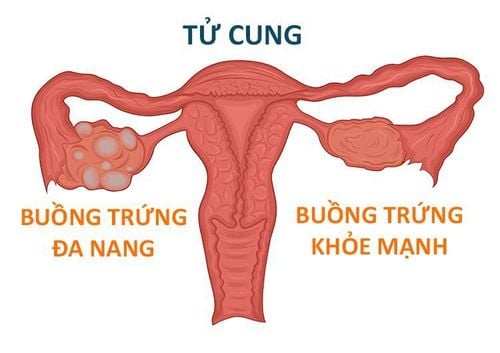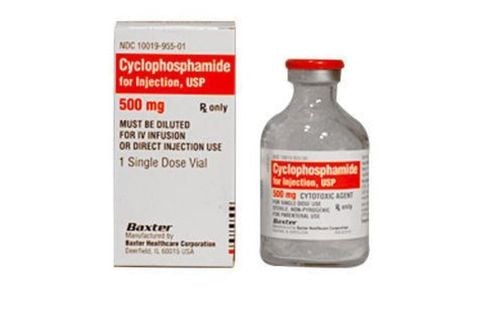This is an automatically translated article.
About 10% of couples of reproductive age in the United States have difficulty conceiving and maintaining a healthy pregnancy. 1⁄3 of these are due to female fertility problems, 1⁄3 due to male fertility problems, and the rest are due to factors related to both partners or unknown cause.If you have regular sex, haven't used birth control for more than a year without conceiving (or 6 months if you're over 35), contact your doctor. According to Resolve, the national infertility association, about 65% of couples who receive treatment for fertility problems are able to have a successful pregnancy.
Here are some common causes of fertility problems in women. The success rates below are based on averages collected from large patient populations. Every couple is unique, so think of the success rate of any treatment as an overall outcome, not as a predictor of your fertility.
1. Ovulation
Ovulation problems occur when eggs do not mature in the ovaries or when the ovaries do not release. These problems are sometimes called premature ovarian failure. Ovulation problems are common in infertile women.Possible symptoms: No or irregular periods, light or irregular menstrual bleeding, or lack of premenstrual symptoms such as bloating or breast tenderness.
Possible solutions: Control your body weight if it's too low or too high, use fertility drugs (with or without IVF) and IVF.
Success rate: 30 to 40% of women taking clomiphene citrate to stimulate ovulation get pregnant by the third cycle of treatment. When fertility drugs to increase egg production are combined with IVF, the pregnancy rate is between 10 and 20% per treatment cycle.
The percentage of IVF treatment cycles that result in a successful case (in which one or more babies are born) is approximately:
40% for women 34 years of age and younger 31% for women 35 to 37 years old 21% for women 38 to 40 years old 11% for women 41 to 42 years old 5% for women 43 years of age and older

Các vấn đề về rụng trứng thường gặp ở phụ nữ hiếm muộn
2. Endometriosis
Endometriosis is a condition that occurs when tissue normally found in the lining of the uterus (endometrial tissue) grows outside the uterus, usually in the abdomen or pelvis.Possible symptoms: Some women have no symptoms, while others experience pain during sex or menstruation, heavy or irregular bleeding, and general pelvic pain.
Possible solutions: Surgery to remove endometrial tissue or open blocked fallopian tubes, fertility drugs (with or without IVF) and IVF.
Success rate: One large study found that 30% of women with infertility related to early endometriosis conceived spontaneously within 3 years of laparoscopic endometrial ablation. uterus .
When women with early-stage endometriosis are treated with fertility drugs and IVF, the pregnancy rate is between 9 and 15% per treatment cycle.
The pregnancy rate per treatment cycle for women with endometriosis undergoing IVF ranges from 2 to 42 %, depending on the age of the woman.
3. Poor egg quality
The quality and quantity of eggs that the ovaries produce - either naturally or with fertility treatments - decrease dramatically after the age of 35.Possible symptoms: None Possible solutions: Assisted reproductive drugs, IVF using your own eggs, IVF with donor eggs or donor embryos. Success rate: Women who have IVF using donor eggs have about a 55% chance of having a baby in each IVF cycle.

Chất lượng trứng kém là một trong số nhiều nguyên nhân gây vô sinh nữ
4. Polycystic Ovarian Syndrome
Polycystic ovary syndrome (PCOS) is a condition in which small follicles in the ovaries fail to develop into larger, mature follicles to release an egg. The condition is also characterized by hormone imbalances and unpredictable ovulation cycles.Possible symptoms: Irregular menstruation, acne and obesity. Possible solutions: Lifestyle changes (such as diet and exercise), clomiphene citrate, fertility drugs injections, ovarian cavity (a surgical procedure that can trigger ovulation), and fertilization test tube sperm. In women with glucose intolerance, the diabetes drug metformin (Glucophage) can also help restore regular ovulation. Success rates: Many overweight patients who lose 5 to 10% of their body weight begin to ovulate regularly. For women with PCOS taking clomiphene citrate, the pregnancy rate per cycle of treatment is about 18%. For women treated with ovarian drilling, about 50% of cases become pregnant within 1 year.

Hội chứng buồng trứng đa nang (PCOS) là tình trạng các nang nhỏ trong buồng trứng không phát triển thành các nang lớn hơn, trưởng thành để giải phóng trứng
5. Fallopian tube problems
Blocked or damaged fallopian tubes prevent sperm from reaching an egg and also prevent a fertilized egg from reaching your uterus. Leading causes of fallopian tube problems include pelvic inflammatory disease, sexually transmitted infections (such as chlamydia), and previous sterilization surgery.Possible symptoms: None. Possible solutions: Surgery to open the fallopian tubes. If surgery isn't successful or if the fallopian tubes are too damaged to repair, they may be removed prior to IVF to improve your chances of getting pregnant. Success rates: Conception rates after surgery vary widely, depending on the location and severity of the duct blockage and the amount of post-operative scar tissue. Couples with fallopian tube factor infertility who attempt IVF have an average 22% chance of having a baby in each IVF treatment cycle. This depends on the woman's age, the extent of the disease in the fallopian tubes or whether the fallopian tubes have been removed, and several other factors.
6. Some other reasons
Your doctor may diagnose unexplained fertility problems if there's no obvious reason for your infertility (meaning all test results are normal).Some experts believe that slight differences in how the reproductive system works can cause this type of infertility. This may include differences in follicle development, sperm function, or fertilization.
Experts also hypothesize that lifestyle-related factors – such as being significantly underweight or overweight, regularly consuming too much caffeine or alcohol, and smoking – may also be factors. factors that increase the risk of infertility.
Possible Symptoms: None Possible Solutions: Assisted Reproductive Medicine (with or without IVF) or IVF Success Rate: For couples with unexplained infertility pregnancy rates are between 9 and 26% per treatment cycle when fertility drugs are used in combination with artificial insemination. With IVF, the pregnancy rate is about 30% per treatment cycle, but that number varies by age. You should refer to the following tips to optimize fertility if you plan to become pregnant in the future:
Maintain a healthy weight: Being underweight or overweight puts you at risk for ovarian disorders egg. Exercise in moderation, avoid overdoing it or exercising with too much intensity as this may be associated with a decrease in eggs. Don't smoke: Smoking causes many negative fertility problems, in addition to your general health and the health of your unborn baby. Make a plan to give up smoking now if you are a smoker and are trying to get pregnant Do not drink alcohol: Fertility is affected if you drink too much alcohol or use strong alcohol . At the same time, the health of the fetus can also be affected later if the mother uses alcohol. Avoid alcohol and don't drink alcohol while pregnant if you are planning to become pregnant. Avoid stress: Many studies have shown that couples who are stressed or anxious will have a poorer response to infertility treatment. Always stay in a good mood if you want to get pregnant and this will come naturally before deciding to intervene.

Khả năng sinh sản bị ảnh hưởng nếu bạn dùng quá nhiều thức uống có cồn hay sử dụng rượu mạnh
Customers can come to the Center for Reproductive Support - Vinmec International General Hospital. This is the leading center in Vietnam, which has developed and applied a comprehensive medical examination and treatment process, combining both gynecology and obstetrics and gynecology to provide the optimal method for each patient's case.
Advantages when customers choose Vinmec fertility center:
Equipped with modern equipment, clean air system according to international standards to ensure lab quality, single cabinet system to optimize quality embryo, improving the success rate for each cycle of artificial insemination. Implement most advanced assisted reproductive techniques in the world: ICSI (injection of sperm into the oocyte cytoplasm); support embryo escape membrane; Reproductive reserve: embryo freezing, sperm freezing, oocyte freezing to help customers take the initiative in giving birth at will, transferring embryos on day 5, minimizing pregnancy; male infertility techniques (PESA, MESA, TEFNA, TESE) Besides advanced reproductive support methods, a team of excellent doctors in the country and the world, with prestige and long-term experience in the field of infertility .
Please dial HOTLINE for more information or register for an appointment HERE. Download MyVinmec app to make appointments faster and to manage your bookings easily.
Reference source: babycenter.comMORE
Uterine fibroids: Causes, symptoms, diagnosis and treatment Common causes of infertility in women Directions for treatment of various types of infertility













